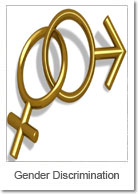Discrimination Areas
Jacksonville Florida Discrimination Lawyers
In general, discrimination, in a non-legal sense, is the discernment of qualities and recognition of the differences between things. We all have the power of discrimination, which is essential for us to be able to make decisions and judgements about things.
However, discrimination in the legal sense has a different meaning. In the employment context discrimination is the prejudicial treatment of a person or a group of people based on certain characteristics. Discrimination on grounds such as age, race, sex, pregnancy, disability, religion, or national origin is generally illegal in many Western societies, while discriminating between people on the grounds of merit is usually lawful. The latter is more commonly referred to as "differentiating." When unlawful discrimination takes place, it is often described as discrimination against a person or group of people.
Unlawful discrimination can be characterized as direct or subtle. Direct discrimination involves treating someone less favorably because of their possession of an attribute (e.g., sex, age, race, religion, family status, national origin, military status, disability), compared with someone without that attribute in the same circumstances. An example of direct discrimination would be not offering a job to a woman because she is likely to take maternity leave whereas a man is not. Indirect or subtle discrimination involves setting a condition or requirement which a smaller proportion of those with the attribute are able to comply with, without reasonable justification. The U.S. case of Griggs v. Duke Power Company provides an example of indirect discrimination, where an aptitude test used in job applications was found to disqualify African Americans at a substantially higher rate than white applicants
Discrimination claims are one of the most common types of claims that an employee can bring against an employer, perspective employer, or former employer. The firm of The Law Offices of Archibald J. Thomas, III, P.A. handles all types of discrimination complaints including discrimination based on sex or gender, pregnancy, race, age, religion, national origin, marital status, disability, and in those jurisdictions where prohibited, sexual orientation. The discrimination laws can be very complex and the time limits for asserting claims of discrimination can be different depending on the specific factual circumstances involved. In general, Florida employees who do not work for the federal government must initially file their charge of discrimination with the Equal Employment Opportunity Commission. A complaint may also be filed with the Florida Commission on Human Relations instead of filing directly with the EEOC. For federal employees, the time limit for initiating a charge of discrimination is much shorter than for other employees. (See section pertaining to federal employees). In most cases, employees must file a charge of discrimination with the EEOC or FCHR prior to filing a lawsuit.
Our firm is often retained to advise employees of the appropriate steps that should be taken prior to the filing of a charge of discrimination with the appropriate agency. In addition, we can be retained to represent employees before the EEOC or FCHR and to initiate litigation in state or federal court. Since the laws in this area are very complex, it is usually a good idea to discuss your claims with an attorney so that you will have an understanding of any time limits involved and any requirements regarding exhaustion of administrative remedies prior to filing suit. Please contact us if you would like to discuss your discrimination claim with one of our discrimination law attorneys.









